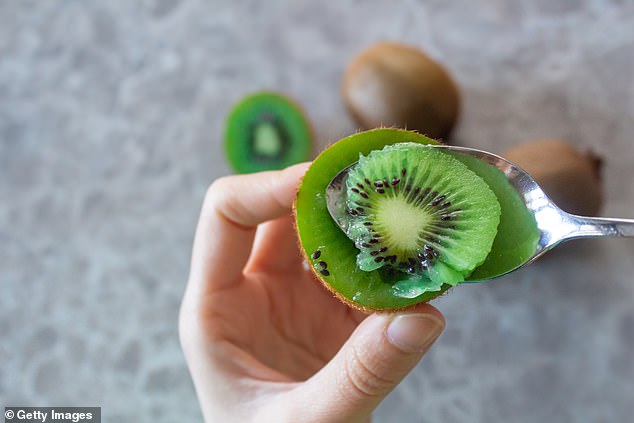It’s no secret that prunes can help get a sluggish system working again.
But there’s another lesser-known fruit that may be just as effective, if not more so, according to a leading digestive health doctor.
A kiwi could relieve constipation almost instantly, said Dr. Karan Rajan, a London-based gastrointestinal (GI) surgeon and social media star.
Dr. Rajan took to TikTok to tell his 5.3 million followers about the four foods that are scientifically proven to improve gut health.
First on the list is kiwi, which Dr. Rajan says is rich in soluble fiber.
This is the type of fiber that attracts water to form a gel in the intestine, which softens stool and increases the frequency of bowel movements.
At high doses, you get all the constipation relief that laxatives offer “without the associated effects,” Dr. Rajan said.
Other foods rich in soluble fiber include figs, avocados, flax seeds, and apples.
One in seven adults and up to one in three children in the UK suffer from constipation at one time or another.
While suffering from the problem from time to time is harmless, frequent constipation is thought to be linked to an increased risk of bowel cancer.
Studies have shown that a chronically sluggish system could increase the likelihood of developing digestive cancers by one and a half times.
This is thought to be due to toxins that build up in the intestine when waste products accumulate over long periods of time.
The more often these waste products are excreted (by going to the bathroom), the better.
Also on Dr. Rajan’s list of gut-boosting foods is coffee.
The energy drink has been “consistently linked to a reduced risk of fatty liver disease and the development of liver cirrhosis,” he said.
‘Coffee contains the dual benefits of soluble fiber and polyphenols, and the polyphenols act as prebiotics to feed good gut bacteria.
Kiwi is high in soluble fiber which draws water into the intestine and softens stool.
“Coffee can also improve intestinal motility, making it beneficial for reducing constipation.”
Instant and decaffeinated coffee have the same benefits, Dr. Rajan added.
Third on the list is a snack you try to eat “every day”: mixed nuts like almonds, walnuts, and pistachios.
The combination provides a “diverse range of prebiotic fibers that promote microbiodiversity in the gut,” Dr. Rajan said.
He highlighted studies suggesting that regular consumption of nuts (about 20 to 30 grams per day) is associated with a reduced risk of cancer, possibly by reducing inflammation in the body and improving the diversity of healthy bacteria in the gut.
The last food on his list is something that “every gastrointestinal surgeon, physician, or dietician loves,” according to Dr. Rajan.
This is yogurt, particularly that containing live active cultures such as Lactobacillus and Bifidobacterium.
This can help increase your “good microbial load,” Dr. Rajan said, adding that yogurt has also been shown to relieve symptoms of irritable bowel syndrome, including constipation.
This is not the first time that Dr. Rajan has offered his followers useful tips to relieve constipation.
Last month, in a clip that has been viewed more than 2 million times, he revealed that blowing bubbles into a liquid is a foolproof method to fix the problem.
She explained that pretending to blow bubbles, a candle or even making elongated ‘moo’s helps control breathing.
Specifically, it activates the vagus nerve, which controls the body’s digestion, causing more wave-like contractions in the intestines and facilitating effortless exercise.
He said: “The sound of mooing and blowing bubbles mimic the same internal physical effect as squatting, but with less pressure.”
“This can help stool move through the colon by increasing intra-abdominal pressure.”
“Although they may seem silly, they are diaphragmatic breathing techniques that strengthen the connection between the brain and the gut,” he added.


